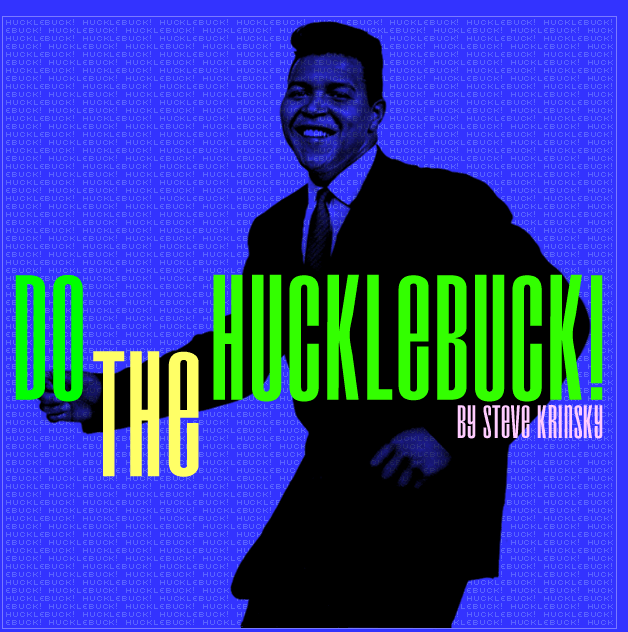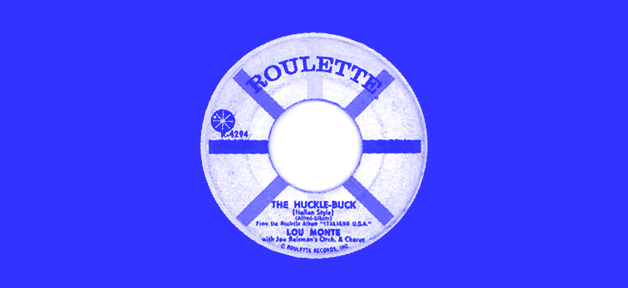
D'Natural
Blues
The version by Lucky Millinder deserves special mention. Although it had
a different name: "D'Natural Blues," it's clearly the same song. In fact,
Paul Williams told me he first heard the Hucklebuck from Lucky Millinder!
A very successful band leader, Millinder was one of the first to shift to small combos after WWII. He was a master of cultivating great young musicians as, over the years, his bands included Dizzy Gillespie, Bill Doggett, Wynonie Harris, Sister Rosetta Tharpe, Ruth Brown, and Eddie Lockjaw Davis even John Coltrane did a stint with Millinder. In 1942, Millinder's band played the Savoy ballroom on a double bill along with Jay McShann and his young alto player Charlie Parker. Then, in 1948, the Lucky Millinder band played a triple bill some say in Newark, some say Baltimore that included the Paul Williams Orchestra. It was there that Williams said he first heard the tune, at a band rehearsal. Teddy Reig heard them play it and Williams wanted to record it but, says Teddy Reig, songwriter Andy Gibson had already sold the song to Lucky Millinder as "D'Natural Blues." This, ultimately, was no problem, as on December 15, 1948, Paul Williams and his Hucklebuckers recorded the tune with a new name. Apparently, Andy Gibson had sold the song twice. Millinder recorded it for RCA Victor, confident that his version would outsell any independent label version. However, he was wrong and a few years later tried to sue, but was too late.
Keeping
The Hucklebuck Going
However popular the Hucklebuck was in its day, no song, or dance, matched
the popularity and impact of "The Twist" Chubby Checker's 1960 hit that
changed the face of popular music. No more jitterbug, no more swing; now
dancers didn't even have to touch each other, all of which allowed The
Twist to become an international pop sensation. However, in 1961, Checker
released a few follow-up tunes, including his version of the Hucklebuck,
which pales in quality compared to many other versions. But it did give
the tune a new life, making the Hucklebuck a dance staple for '60s teenagers.
Other versions quickly followed: Annette Funicello, Mickey and Sylvia,
Bo Diddley, King Curtis, Johnny and the Hurricanes, Xavier Cugat, Count
Basie, even Sammy Kaye.
The Basie connection is interesting as, starting in the early '50s, Basie sidemen, notably Buck Clayton, had recorded the Hucklebuck in various combinations. In 1953, Clayton organized a jam session that recorded a 20-minute version of the Hucklebuck! When Basie himself finally recorded the song a decade later, his producer was none other than Teddy Reig.

Standards
And Classics
How do songs become standards? Obviously because audiences want to hear
the songs and musicians play them over and over. But some songs beg to
be covered, they have catchy elements and a familiar sound. Some simply
become hackneyed copycat versions. One test of a standard's strength is
it continuing to be played long after its initial success, especially
when recent versions are as interesting as the originals.
"Maple Leaf Rag" has been recorded hundreds of times, since it was written in 1904, up to today. A jazz classic like "Caravan" shows up in all sorts of styles, while "Louie Louie" is the garage rock classic that led Rhino Records to release two albums of covers. Clearly, the list is long and the tunes are many.
But arguably no standard has been covered in as many different styles as the Hucklebuck. There are numerous blues versions: Earl Hooker, Pinetop Perkins, Canned Heat, pop versions: Frank Sinatra, Annette Funicello, Kate Smith!, jazz versions: Lionel Hampton, Quincy Jones, Ray Bryant, novelty versions: Lou Monte's "Italian Hucklebuck" and Homer and Jethro's country/parody version, easy listening versions: Billy Vaughn, Ironstrings, a rockabilly version: Billy Lee Riley, a rumored Yiddish version: Mickey Katz, a ska version: Byron Lee and the Dragonaires, and a Latin version: Ray Baretto. There's even a Muzak version listen for it on your local elevator.
Not just in the U.S., either. The Hucklebuck has long been a fave in Ireland where Brendan Bowyer and the Royal Showband recorded it and a few other Hucklebuck variations in the '60s and performed it in pubs and dancehalls on numerous "Hucklebuck" tours. In the '70s, an Irish punk band called Radiators from Space, one of whose members went on to join the Pogues, also recorded it, while recently, Seanchai (an offshoot of the NY-based Irish band Black 47) recorded a punk reggae version called "Da Hucklebuck."
Alternatively, some have copped the Hucklebuck idea without the song. Zydeco king Clifton Chenier did a hot accordion Hucklebuck; same sentiment, different melody. John Lee Hooker and Jimmy Preston both turned it into a verb; one that turns up in other tunes, often in rhyme, that are not Hucklebucks but still mention it. In 1952, Buck Clayton recorded a session with the Jesse Powell Orchestra, whose band included trombonist JJ Johnson and Lucky Millinder alum Bill Doggett, playing a tune with risque vocals by Fluffy Hunter called "Walk Right In." The song has a line that says: "I got a man who loves to Hucklebuck/When he gets home all he wants to do is.../Walk Right In."
The Hucklebuck can also be found in poems, short stories, movie soundtracks, comedy bits and a myriad of other places, including in live performance and studio recordings. In the 1990s, it was recorded by a reformed version of Canned Heat (1990), a take-off by The Fall (1991), by Lee Rocker, formerly of the Stray Cats (1993), by Chicago bluesman James Cotton (1994), by Porky Cohen (who played in Lucky Millinder's band in the 1940s) as "D'Natural Blues," by insurgent country band the Riptones (1999), by Texas guitarist (and former King Curtis band member) Cornell Dupree (1995), who calls it "Hucklebuck/Now's the Time." Alex Chilton and James Cotton still do it in their live shows.
However, the controversy about the origins of the Hucklebuck continues. On their most recent album, those sophomoric phone pranksters, the Jerky Boys, conduct a bogus interview with Juggy Gayles, aka Georgie Resnick. Gayles was a well-known song plugger, whose publishing company owned the rights to the Hucklebuck back in the early days. When the interviewer asks him about "that prick" Lubinsky, Gayles states that, "Lubinsky didn't have nothing to do with the Hucklebuck."
While there's nothing funny about the Jerky Boys, Juggy Gayles reminds us that the tune has a complicated history. Unlike the Hucklebuck, which seems to have a lot of life left in it, Gayles himself died this past spring aged 86.